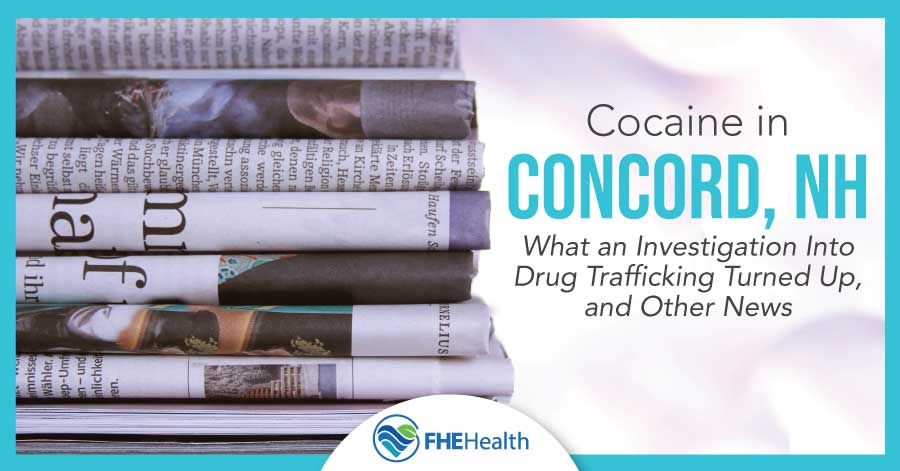
Birthplace of the world’s first alarm clock and home to the country’s first free public library, New Hampshire has made some memorable headlines in its time, but these days, the state’s drug trafficking problem is, all too often, generating news. This month, U.S. Attorney Scott W. Murray issued indictments for nine men accused of conspiring to distribute powdered cocaine and crack cocaine. The charges came after the FBI, in conjunction with other federal, state, and local law authorities, completed their year-long investigation into the ring.
In recent news, the Concord Monitor reported that New Hampshire has the “third-highest for per-capita drug deaths nationwide, falling behind only West Virginia and New Mexico,” in the nation. State officials are prioritizing the drug trafficking problem, but recent headlines addressing the issue are sobering.
It’s Not Fake News: Pepperoni Pizza and Cocaine
Recent drug news out of New Hampshire seems unbelievable— and, yet, it’s true. In one arrest, Concord police arrested a pizza parlor owner for selling cocaine and marijuana along with his pies out of his shop. In another bust, police charged a woman with cocaine trafficking in a Burger King Parking lot. In yet other news, Manchester police arrested a woman during a traffic stop for hiding crack cocaine in her bra. The drug news emanating from the state may seem unusual, but it’s not humorous, and it highlights a serious drug trafficking problem for New Hampshire.
Drug Trafficking in New Hampshire
Last year, the Department of Justice awarded New Hampshire and Massachusetts a federal grant worth millions to partner together to combat the region’s drug trafficking problem with a specific emphasis on heroin and fentanyl. Opioid-related deaths in New Hampshire alone are three times the national rate. Although the opioid crisis continues to be a challenge for both states, recent trafficking busts related to cocaine and meth are alarming. According to statistics, the most common drugs of abuse in New Hampshire are:
- Cocaine (powdered and crack cocaine)
- Heroin
- Marijuana
- Prescription Drugs (including opiates like fentanyl)
Many people examining the trafficking problem for New Hampshire look to the state’s 13-mile coastline, but the National Drug Intelligence Center has determined that the increase in drug trafficking in the state is a problem it can blame on its neighbor Massachusetts.
The Trouble with Neighbors
The American poet Robert Frost, who spent much of his life in New England, famously wrote that “good fences make good neighbors.” When it comes to drug trafficking, however, the experts have concluded that fences and walls do not curtail the problem, as most of the illicit drug trade is associated with ports of entry into the country.
For New Hampshire, the main source of its drug trafficking problem in Massachusetts. Drugs continue to enter the state via its ports and airports like Logan Airport.
Drug experts have traced many of the region’s illicit drugs to the Dominican Republic, China, and Mexico. Once the drugs get into Massachusetts, particularly its urban centers, traffickers drive them into New Hampshire via its three main north-south highway networks.
In this case, no wall or fence can solve the trafficking problem. The goal, for now, is to combat the emerging presence of gang activity in the state and to partner with Massachusetts to target specific trafficking hot spots like the Massachusetts cities of Lowell and Lawrence that are feeding the drugs into New Hampshire.
Recent Cocaine Trafficking Busts
The nine men charged with trafficking cocaine in New Hampshire face the prospect of 20-year prison sentences and fines of up to $1 million each. This case, while led by the FBI, demonstrates that the partnership between New Hampshire and Massachusetts to combat the drug trafficking problem can work. The investigation into this particular ring took one year before the indictments could be released. The ultimate goal for authorities is to stem the tide of drugs that are flowing into New Hampshire’s streets.
Will You Do Your Part?
Law officials of New Hampshire and Massachusetts are working to disrupt trafficking supply chains, but their task is considerable. Logic suggests that the supply chain will continue so long as there is a demand for illicit drugs. The state is doing what it can to tamp down on drug use like maintaining its refusal to legalize marijuana, which other states across the country are legalizing or seriously considering legalization. Yet, so long as citizens of the state continue to abuse drugs, the traffickers will target them.
As a private citizen, you can’t root out the drug problem, but you can get help for yourself if you are addicted to drugs or abusing them. You may also want to convince a loved one like a family member or good friend to seek help for their drug problem. FHE Health features a complete spectrum of behavioral health services including addiction treatment. They offer medical detox programs and treat individuals who are combating addictions to alcohol, illicit drugs, and prescription drugs with evidence-based therapies designed to help individuals manage their addiction and prevent relapse.
Drug-related deaths in New Hampshire are high, but death isn’t the only risk. Drug addiction and abuse can lead to profound physical and mental health problems that diminish the quality of life. Managing an addiction successfully is possible, but it requires professional help of the kind that individuals can find at FHE Health.






